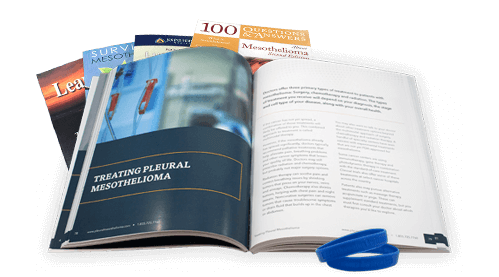Do Some People Survive Mesothelioma?
Yes, some people do survive mesothelioma. It isn’t the norm, but some people survive for many years, even decades.
A mesothelioma prognosis is typically grim, but long-term survivors show newer, better therapies and specialized care are helping some patients live longer.
It’s not the statistics that provide hope, but words from survivors that reveal the strength and determination it took for them to outlive the typical prognosis.
And although there is still no cure for mesothelioma, current treatments for mesothelioma are helping certain patients live for years with the cancer.
Survivors of mesothelioma are telling their stories, providing insight into why and how some patients are survivors.
“I tell people all the time, don’t just take what the first doctor tells you and accept it. That’s wrong. Get other opinions and see what is out there,” said Kathleen A., who was diagnosed in 2010.
“There are treatments that are working,” she said. “Find them.”
Why Some Live Longer Than Others
Some patients live longer because of the treatments they choose, their overall health and how fast their cancer grows.
How long someone lives with mesothelioma depends on a number of factors, including the stage of mesothelioma at diagnosis and its location, the overall health of the patient and their age.
Another factor is the care a patient receives and the doctor who is spearheading the treatment.
Because many medical professionals rarely see this cancer, it’s important for patients to find a mesothelioma specialist who understands the disease and knows how to treat it effectively.
A multimodal approach that includes a combination of surgery, radiation therapy and chemotherapy has worked well for some. Others found success with clinical trials testing immunotherapy, which uses the patient’s own immune system to fight the disease.
Another reason for varying survival rates is individual response to treatment. Some patients respond particularly well to a specific treatment, while others have little to no response.
Clinical Trials
Clinical trials offer the latest and most innovative therapies that have not been approved by the U.S. Food and Drug Administration. Gene therapy, immunotherapy and anti-angiogenic therapy are among the options available through clinical trials.
Numerous survivors have benefited from participating in a clinical trial. Immunotherapies, new chemotherapy drug combinations and even surgery are available through clinical trials.
Complementary and Alternative Medicine
A number of survivors attribute their success to integrative medicine, also known as complementary and alternative medicine.
Many long-term survivors have opted to combine complementary therapies with conventional cancer treatments. Herbal medicine, acupuncture, yoga and relaxation therapies are among the many integrative therapies used by mesothelioma survivors.

Stories from Mesothelioma Survivors
- Joanne D.
-
From: Oregon
Diagnosed: 2009At a doctor’s appointment in November 2009, Joanne D. learned she had pleural mesothelioma.
“It was a heart-wrenching moment. I felt like I was hit in the gut. I was lost for words. All I wanted to do was scream. I didn’t know what to do or where to turn to for help,” Joanne said.
She has come a long way since the day she was diagnosed, but her journey hasn’t been easy.
After seeking a specialist and receiving a second opinion, Joanne trusted the late Dr. David Sugarbaker — who worked at Brigham and Women’s Hospital in Boston at the time — with her care. Sugarbaker ordered a pleurectomy, a surgery to remove the lining of the lungs.
Joanne has since had two recurrences, followed by surgery and chemotherapy.
“I may have been diagnosed with mesothelioma, but I am going to be a survivor of this disease. You can bet on that,” she said.
Joanne hopes her story will encourage other pleural mesothelioma patients.
“Attitude is everything,” she said. “It’s what gets you to the next step as a survivor. And don’t underestimate the power of a support system. My friends and family have been everything. Don’t be afraid to ask for help.”
- Tim C.
-
From: Kennesaw, Ga.
Diagnosed: 2002Tim C. passed the 10-year survivor mark in 2012, grateful to see his two oldest children go to college and get married.
He credits the aggressive extrapleural pneumonectomy surgery for allowing him to survive this long. He was diagnosed younger — in his 40s — than most pleural mesothelioma patients.
He also responded well to the treatment plan he received in Boston with Sugarbaker. In the last 10 years, he traveled extensively, including a motorcycle trip across the country.
“Controlling the pain has been a constant battle for me,” he said. “That’s no fun, but I’ve done a lot these last 10 years. I didn’t sit around. I lived another lifetime.”
- Sydney R.
-
From: Texas
Diagnosed: 2011Sydney R. was diagnosed with pleural mesothelioma in June 2011 and was given 12 to 18 months to live.
She didn’t like that prognosis, so she did her own research. Sydney got second and third opinions, questioned everything her specialists said and did all she could to get the best possible treatment.
To date, she has had a pleurodesis, multiple rounds of chemotherapy and radiation, a pleurectomy and a pneumonectomy. She is ready to keep fighting.
- Andy A.
-
From: California
Diagnosed: 2010Andy A. spent 20 years of his life in the home improvement industry, where he was regularly exposed to asbestos. He was diagnosed with pleural mesothelioma in February 2010.
He looked to specialist Dr. David Jablons for his care and enrolled in a clinical trial involving Amatuximab (MORab-009), an immunotherapy drug.
He survived more than seven years and attributed his survival to the trial and trying medical-grade CBD oil.
- Kathleen A.
-
From: Wisconsin
Diagnosed: 2010Kathleen still wears the button her son gave her, which reads, “I’m a patient with no patience.”
And it describes her attitude well. She didn’t like the first diagnosis she was given because it offered little hope and few choices.
She insisted on second and third opinions and opted instead for an aggressive pleurectomy and decortication surgery with Dr. Tracey Weigel at the Carbone Cancer Center in Madison, Wisconsin. She recovered quicker than expected and resumed traveling the country.
Kathleen believes her aggressive treatment and her faith have carried her.
“I don’t know how anyone can get through cancer if they don’t have God in their life,” she said. “I think that’s big.”
- Jodi P.
-
From: Minnesota
Diagnosed: 1999Jodi P. was diagnosed with pleural mesothelioma at the young age of 26.
After receiving an initial misdiagnosis of pneumonia twice and two different mesothelioma diagnoses with different stages and treatment options, Dr. Claude Deschamps performed an extrapleural pneumonectomy, followed by chemotherapy and radiation.
Jodi celebrated her 30th birthday by going skydiving, fulfilling a lifelong dream.
- Judy G.
-
From: Minnesota
Diagnosed: 1990Judy G. was diagnosed with pleural mesothelioma in 1990 and lived until 2010. She strongly believed in the power of alternative medicine including meditation, massage therapy and nutritional remedies, in addition to surgery.
Her story is told in the book, “Surviving Mesothelioma: Making Your Own Miracle.”
- Bob O.
-
From: Wisconsin
Diagnosed: 2005Bob O. was diagnosed with pleural mesothelioma in 2005 and was given 18 months to live, which convinced him to do things his way.
He elected to undergo a pleurectomy and decortication, but he opted for no chemotherapy or radiation. Instead, he altered his diet to add in loads of antioxidants to boost his immune system and stayed active. Many years later, he was able to go fishing almost every day.
- Marlyn L.
-
From: Maryland
Diagnosed: 2000Marlyn L. worked as a hair stylist for 25 years before she was diagnosed with pleural mesothelioma at age 47. After the doctors at the Naval Medical Center in Maryland took a biopsy and determined her diagnosis, she was referred to Dr. Valerie Rusch in New York.
Her tumor was large, so she started chemotherapy right away. Dr. Rusch later removed the tumor, five upper ribs and a portion of her right lung. Although she can no longer style hair, she never gave up her fight and still travels with her husband.
- David C.
-
From: New Jersey
Diagnosed: 2005David C. is a Marine Corps veteran from New Jersey. He was diagnosed with pleural mesothelioma in 2005 and had an extrapleural pneumonectomy performed by Sugarbaker at Brigham and Women’s Hospital.
Six years later, he was dancing the night away at his grandson’s wedding reception.










